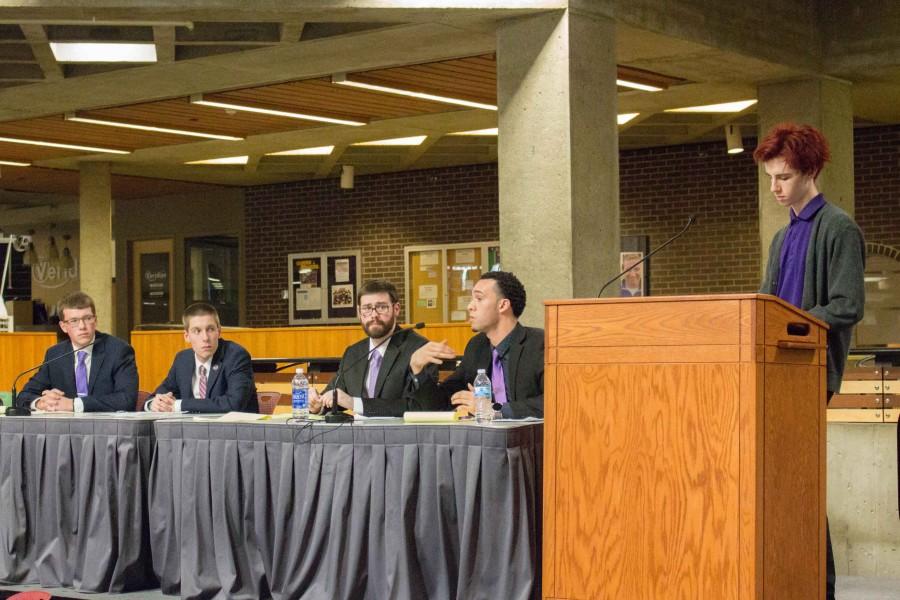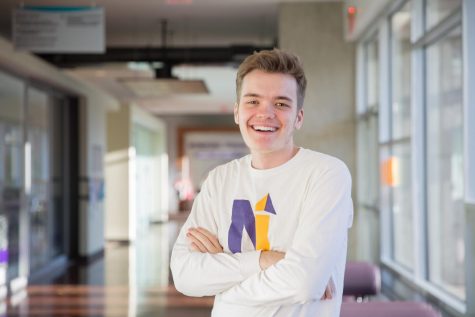Hopefuls Debate
Feb 18, 2016
Roughly 80 UNI students gathered in the Maucker Union main floor on Feb. 16 to watch the 2016 NISG senatorial and presidential candidate debates.
The two tickets: Hunter Flesch and Avery Johnson, and Jamison Whiting and Aaron Friel, debated for about an hour on diversity and discrimination, mental health, student organization financing and qualifications for holding office. The candidates also took questions from the audience.
Northern Iowan executive editor, Nick Fisher served as the moderator for the debates. Elections will be held on Feb. 23 and 24, when students may vote on MyUniverse.
Flesch, a sophomore elementary education and middle level education double major, and Johnson, sophomore English major, have promoted their platform under the slogan, “Stronger Together,” and are focusing on three main issues in their campaign: mental health, sustainability and student engagement.
Whiting, junior philosophy and political science double major, and Friel, a non-traditional student majoring in mathematics and computer science, have been updating their platform as they campaign.
“It’s not OK to just put out three bullet points of what you’re going to do at this university because, you know, that’s what people have been doing in the past,” Whiting said of Flesch’s and Johnson’s platform. “And putting those three points out there and saying that this is what’s going to happen really isn’t a suitable answer when you’re talking to 12,000 students.”
“The biggest thing we want students to know from our platform – and our campaign in general – is that we care about students,” Flesch responded. “That’s our driving passion behind our whole campaign.”
Diversity & inclusion
In addition to differences in campaign strategy, the tickets distinguished themselves on a number of issues. One of the most contentious exchanges occurred over diversity and discrimination on campus.
Both candidates agreed they’d support a curricular exit requirement proposed by certain members of NISG, and that they’d use the work of Hansen Breitling, NISG director of diversity and student life, as a model for next year.
However, Whiting claimed that Flesch and Johnson neglected to reach out to the multicultural organizations on campus, such as the Black Student Union (BSU). Kaila Pachecho, junior global marketing major, went on to level a similar allegation during the town hall forum following the formal debate. Johnson responded by saying that they had reached out to the BSU and a meeting with executives from the organization had been scheduled for Feb. 17.
Recruitment policies
Fisher questioned the candidates as to whether they would support a review of recruitment entities on campus over “misleading advertising” that attempts to sell prospective minority students on the idea that UNI is more diverse and inclusive than it actually is. Flesch, member of Student Admissions Ambassadors (SAA), a group that leads campus tours, offered firsthand experience on the issue.
“We have to sell UNI in a certain way,” Flesch said. “And it makes me cringe when we have to say UNI is really diverse. We have to think twice about what we’re saying, when in reality, minorities are not being supported enough. And we really want to make sure that we’re supporting these students as much as possible.”
Friel said he would support a review, saying policies in place aren’t always followed.
Psychiatric care
Both tickets disapproved of a proposed charge to students seeking psychiatric care, especially without further research. Flesch and Johnson mentioned their plan to host an annual mental health awareness week-long event akin to Sexual Assault Awareness Week, sponsored by SigEp. They also said they plan on working with the Department of Residence (DOR) to list emergency contacts on the back of all UNI IDs.
While agreeing with Flesch’s plan to increase access to emergency contacts, Whiting criticized the creation of a mental health awareness week.
“You can’t really address the complexity of mental health in just one week,” Whiting said.
Johnson responded by stressing that the week-long event would primarily serve as a way to bring resources to the student population by raising both money and awareness for mental health issues, as well by urging collaboration with student organizations throughout the year.
Student org. finance
Fisher said NISG is receiving a sizable increase in funds from approximately $180,000 to over $300,000 and asked how the candidates would improve financing processes “beyond just throwing more money at more student orgs.”
Friel, who serves as the chair of the Organization and Finance Committee, said he would like to set aside money for flyers and printing costs for organizations for the first week of the school year, among other proposals. He said he’d build a new website to make NISG more transparent, touting his experience as an IT consultant.
Flesch stressed “a lack of clarification for student organizations,” though Friel said organizations “are already inundated with information.” Flesch proposed creating a guide that would clearly state all the opportunities that are available to student organizations. He proposed a speed dating-like event in which representatives from different organizations can meet and agree to co-sponsor events together.
Time management
Responding to a direct question from Fisher, Johnson said he didn’t think Whiting would be able to manage his time between football and his duties as student body president.
Whiting said athletes’ schedules are more flexible than is generally known, especially during spring semester. He also said the president sits on much fewer committees than the vice president.
“Honestly, it’s [about] if I’m going to have enough energy. And with modern science – and now energy drinks – I’m pretty good at staying awake,” Whiting quipped.
Sophomore finance major, Wes Ennis, voiced his concern regarding Whiting’s athletic obligations.
“If Jamison was to have a meeting with President Ruud but a game on the same day, I’m not so sure he would take that meeting over the game,” Ennis said. “I just don’t think that anyone who wants to fully do this job to the best of their capabilities should be having two enormous time commitments like that.”
Elizabeth Martin, sophomore political science major, said she wanted to hear more about how the candidates would connect NISG to students.
Mark Jolcover, senior sociology major, said he wanted to hear the candidates show they care for students.
“How are you guys gonna get your hands dirty and maybe get your hands off the pens and signing documents?” Jolcover asked.
“We’re students as well; we are approachable people,” Flesch said. “We really want to sit down and have a conversation with students and really understand what their struggles are.”










